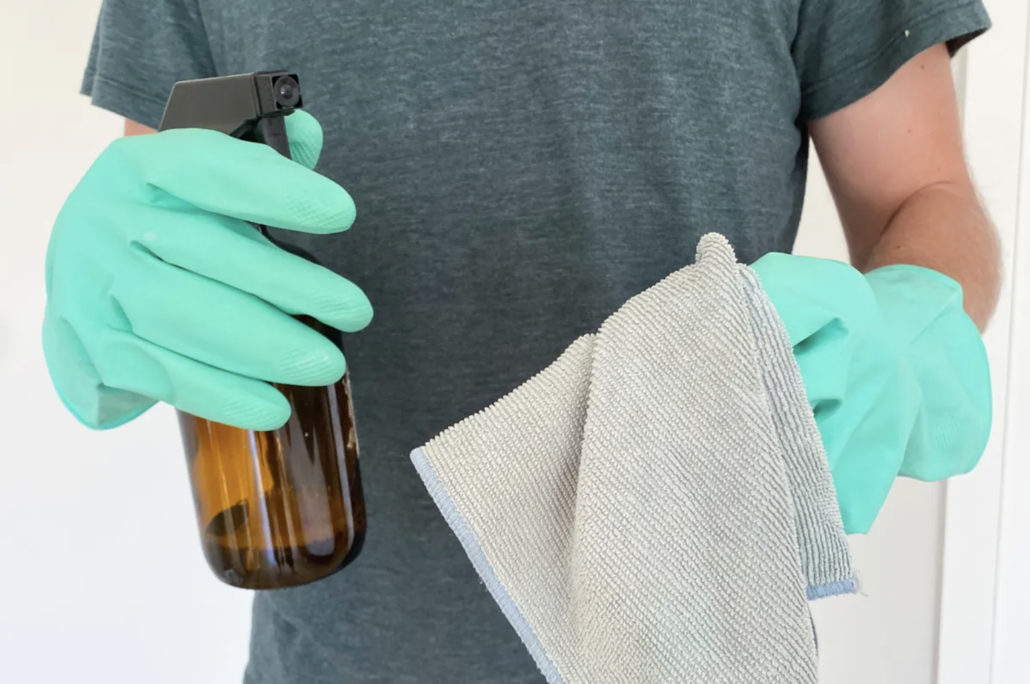CHE Meets the COVID-19 Challenge
by Kyra Epstein, Commonweal Communications
June 30, on a Collaborative on Health and the Environment (CHE) live webinar, more than 300 people assembled to hear experts talk about how to use safer, greener cleaning products to disinfect child care facilities and schools during COVID-19. Participants included government representatives from 20 states and a reporter from National Public Radio. The week before, a webinar on endocrine-disrupting chemicals in the COVID-19 world drew more than 350 live attendees. The webinars are part of CHE’s diverse response to the needs of their constituency that emerged since mid-March— a constituency that includes both CHE’s scientific community as well as parents, caregivers, and policymakers for young children.
“When COVID hit in the United States, we switched everything over in our Because Health project to talk about COVID—focusing on how parents could keep themselves and their children safe and healthy such as using safer disinfectants and cleaning products,” said CHE Director Dr. Karen Wang. “Environmental health is part of public health—and we felt it was our responsibility to talk about COVID-19. We focused on what was going on and what was relevant to people’s lives.”
CHE’s Because Health initiative, with a focus on young parents and caregivers, posts weekly news articles on their website (with 100,000 monthly visits) and social media. During COVID and sheltering-in-place, topics included indoor air quality (while everyone was locked down in their homes) and gardening, as well as safer disinfectants.

With concern about cleaning and the need to kill the COVID-19 virus in the home, Because Health provided science-based information on exactly what is needed—and not needed—to stay safe. “We didn’t want people using bleach on everything since it’s not needed, and we wanted to emphasize that some disinfectants actually cause health problems, like asthma,” Karen said. “Especially in settings with young kids, it’s important to know that there are safer options than traditional disinfectants. There are active ingredients that are effective against coronavirus that people can use, such as hydrogen peroxide, citric acid, lactic acid, and alcohol-based products.”
In response, they developed A Complete Guide to Non-Toxic Cleaning and Disinfecting During the Coronavirus Pandemic. That guide led to another popular effort released in June: toolkits for safer cleaning and disinfection during coronavirus in the home and at childcare facilities and schools. The webinar for childcare facilities and schools followed. The goal has been to put science-based suggestions into easy-to-access formats that galvanize young parents to be informed and advocate for their families’ health. The toolkits even contain a short sample email to send to the administrators of childcare centers and schools, asking for specific safe and healthier practices.
Karen said that she wanted to see the toolkits developed, in part, because she’s had many friends ask her to consult with their daycares and schools. “Sheltering in place,” she said, “I have a 10-month-old and a 5-year-old. Juggling all this with no child care is really difficult. We’ve had to make changes, and it is tough. I feel for parents who are trying to juggle so many things.”
At the same time as all of the Because Health offerings, CHE also focused on providing the scientific community with needed conversations and other information about COVID-19 and other topics. These include the webinar on endocrine-disrupting chemicals in the COVID-19 world as well as a webinar on Safe Drinking Water and Indoor Air Quality when Schools Reopen (this week: August 5). Another webinar is upcoming: Air Pollution and COVID-19.
Karen sees a silver lining in the enormous grey cloud of the COVID pandemic: an increased focus on health, wellness, and prevention.
“It is interesting to see so much emphasis on prevention,” Karen said. “I’d like to see that lens of prevention move to more areas of public health where we can positively impact our health—consumer choices, changes in government policy, requirements for companies to disclose ingredients, more affordable organic foods, and many others,” she said.
Find out more about CHE at their website and on social media (Instagram and Facebook), and donate to support CHE’s programs here.
List of COVID-related resources from Commonweal’s Collaborative on Health and the Environment include:
Because Health
1) Toolkits
- Home
- Early Childcare Providers and Schools– includes sample email for parents to send to ECP and Schools
2) Articles specifically about COVID-19
- A Complete Guide to Non-Toxic Cleaning and Disinfecting During the Coronavirus Pandemic
- Preserving Your Sanity During COVID-19
- Coronavirus Resources, Including Safer Disinfectant Resources
- How to Properly Wear and Clean Your Face Mask
- What You Need To Know About COVID-19
3) Other content we have been producing that are related to COVID19 and sheltering in place. See more on our website and more on our Instagram.
- Non-toxic hand soaps
- Non-toxic hand sanitizers
- DIY hand sanitizer article
- Using hydrogen peroxide as a disinfectant
- Non-toxic hand creams (for all that hand washing)
- DIY All purpose cleaner
- DIY cleaning supplies list
- Green cleaning checklist
- Book recommendations for adults and kids sheltering in place
- Movie/TV recommendations for adults and kids sheltering in place
- Nature themed creative activities for kids and adults
- Indoor vegetables you can grow easily
- Vegetables you can grow from scraps
- Making Your Vegetables and Fruits Last
- Air purifiers recommendations
- Air purifiers article
- Roundup of nontoxic yoga mats to buy
- DIY yoga mat spray
- Article on yoga mats and health hazards
- Compost article
- Victory garden revival article
- Lead in soil article
CHE webinars
1) Disinfecting, Cleaning, and Best Practices for Protecting Your Family During the COVID19 Pandemic
3) Endocrine Disrupting Chemicals and COVID-19
4) Improving Water Quality in Schools and Childcare Facilities During COVID-19
*Future webinars we are planning: Air Pollution and COVID-19.